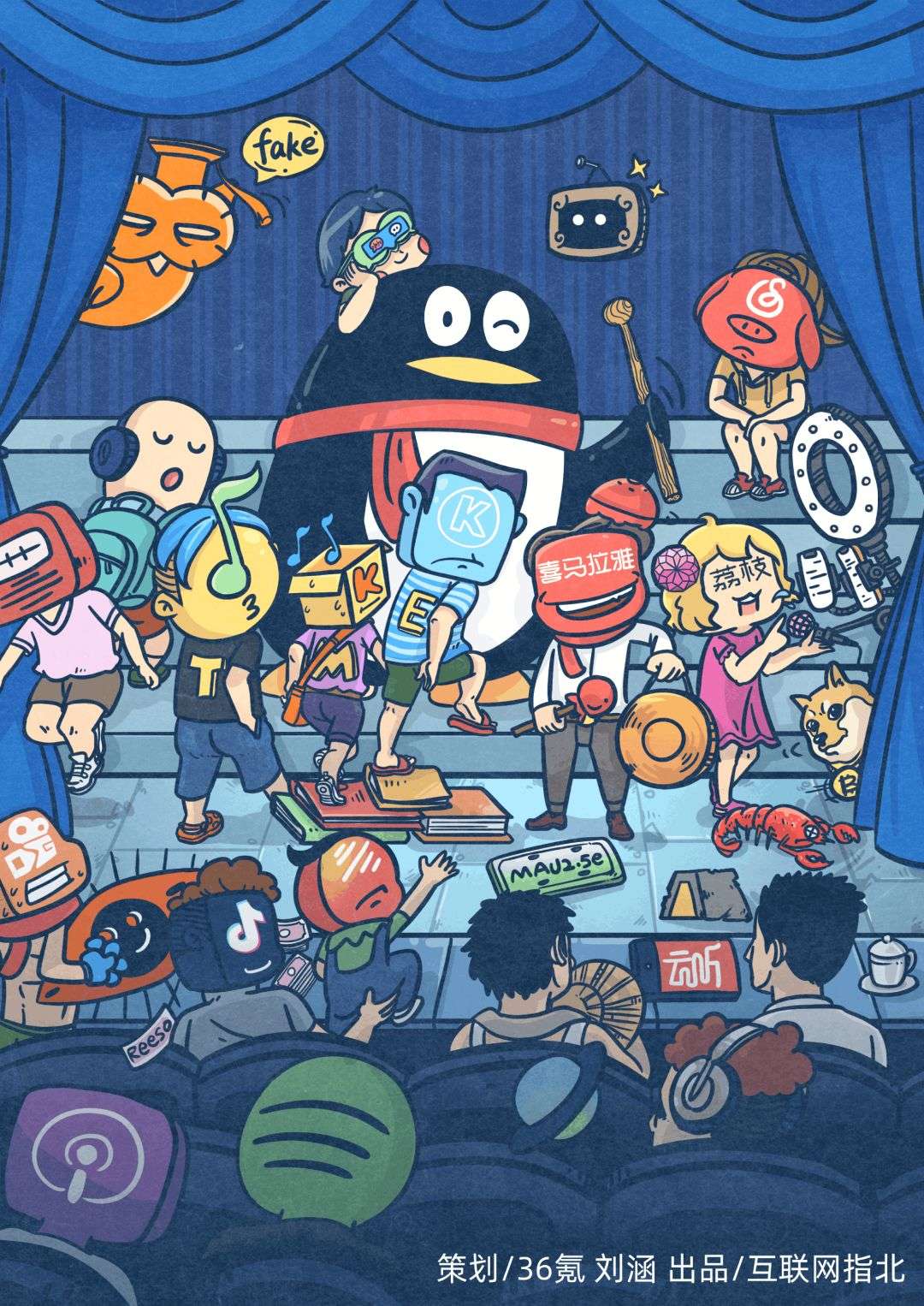“Ear Economy” Chorus: What stories can you tell on the way to “money”?
Author: Hong Xian p>
Editor: Pu Fan
Krypton appointment column planning: Liu Han
This article is produced by × Internet Zhibei United, first published on the website
What do you think about the listing of Himalaya in May of this year? “Have high hopes” seems to be a very appropriate adjective.
Prior to this, although multiple listing rumors have been actively or passively refuted, whether it is in social public opinion or industry media, people have long talked about Himalaya as a “quasi-unicorn” company: after all, as a long-term The “sexy sunrise industry” deeply bound to the most topical labels in the Internet industry such as content, creation, knowledge, IP, and the new economy, whether it is the “ear economy” or the long-term anxious us, we need a wave too much The increase in the capital market has boosted morale.
However, “high hopes” is one aspect, and “expectations fulfilled” is another. Especially when the Himalayas formally put the “ear economy” on the stage from the “circle” in the form of a prospectus in a “transparent” manner, many data and examples seemed to show that people did not understand as much as they thought. “Ear economy”, the complexity of the status quo of this industry may be far underestimated——
For example, if “audio” is really the content carrier that can theoretically use time fragmented and has high flexibility, then why does the Himalaya, which has the most resources in the industry, have accumulated over the past three years? With a loss of 2.1 billion yuan, is the “ear economy” really as sustainable as imagined?
Another example, from podcasts to clubhouses, there are constantly newThe new technology and the turmoil of the entry of new giants seem to prove that the development of the audio market is the general trend of the standard, so why is our industry not showing a hundred flowers? Is it obviously uneven?
And who are the players in the audio market now? What are their respective living conditions? Compared with short videos, long videos, and graphic content, does the value created by audio as an entrepreneurial outlet really meet people’s expectations?
Open your imagination and connect these issues together. “Ear Economy” is too much like a chorus: they do not lack volume, and even have a sense of beauty. In theory, people are willing to treat them as more advanced “expression.” ; But it is difficult for them to give out the volume, the command, vocalization, accompaniment, body, and even where they appear on the stage all affect the final presentation.
In fact, when most people talk about the “audio industry”, the scope of the “audio industry” is often very clear: Himalaya FM, Litchi fm, and Dragonfly fm are three companies that cannot be avoided. It can even be said that compared to the Internet giants that only gradually incorporated long audio functions into their music apps later, it is actually these three FMs who have completed the process of market training and consumer education for the industry, and established the Chinese people’s “long audio” process. “Awareness.
But their position in the audio market is not as strong as imagined. The development of podcasts and the admission of Internet giants have changed the position of performers on this occasion after 2020, and at the same time, no one can really lead the singing.
In the domestic audio market, many data show that Himalaya FM is the most important role to ignore: According to its prospectus, 75% of the online long audio playback needs of domestic mobile devices are provided by Himalaya. In the “2019 China Network Audiovisual Development Research Report” released earlier, inIn the more critical data of user penetration rate, Himalaya’s record is 62.8%
So on May 1st of this year, Himalaya submitted a prospectus to the US Securities and Exchange Commission and really embarked on the road to an IPO. The industry media showed a mood that “what should come is finally here”. After all, if such a façade is unable to “beat capitalist leeks”, then the so-called “content industry imagination” would be a bit too silly.
Of course, what Himalayas are not ringing is a brand new bell. Before 2020, Litchi FM was listed on Nasdaq and became the first online audio-and it did not seem to have the best time to ring the bell. ——Similarly, according to the prospectus, Himalaya is firmly in the top spot among domestic audio users, but the prospectus also discloses the current status of Himalayas not yet profitable.
This is the reason why the Himalayas are ringing gongs instead of heavy bells. Perhaps this is some kind of “satisfaction”.
As for where to find revenue? Himalaya has tried different paths, such as the “Internet of Things”. The red smart speaker “Xiaoya” behind it is what Himalaya made in 2017. It can only be said that Xiaoya, who was born untimely, did not spell out her own world from the war of Tmall Elf, Baidu, and Xiaomi’s three smart speakers. The biggest contribution is to make Himalaya LoT thinking a good start. Completed the “early start”.
The “MAU2.5e” on the new energy license plate represents a kind of “thrilling leap”-the prospectus shows that out of the 250 million monthly activities of Himalayas, 146 million people are from third parties such as car audio and smart terminals. The platform visited the Himalayas. It coincides with the prosperity of domestic new car manufacturers. According to reports, more than 60 car companies have implanted Himalayan in-car content. If the story does not stop at “PPT car making”, Himalayan will increase monthly life. There is also a story of “Qiantu”.
As for the first stock of online audio, what about the performance of Lichee FM? It doesn’t seem very good either.
Lichi’s financial report last year showed that in the second half of 2020, the number of paying users continued to shrink, with a payment rate of less than 1%; revenue also relied too much on live broadcasts, accounting for 98.6% of total revenue, so that for a long time , The industry media like to describe the status quo of Litchi FM with “the market value of the company has shrunk by 60% (or the stock price) in the first year of listing”. “mode.
Including that there was a wave of rise of more than 75% in Litchi FM in October last year.Most of the reason comes from the favorable policy of “approved as one of the Guangdong Internet audio-visual pilot institutions”. Prior to this, the stock price had just experienced a wave of “tragedies” that evaporated 82% of the highest price on the day of listing. Even if it makes up for the increase, it cannot be said that “the situation is very good”.
But I have to say that the “luck” of lychee is really good.
At the foot of Litchi FM is a Shiba Inu wearing Bitcoin. Musk, a virtual currency pusher, also brought a voice social application clubhouse to the fire. This popular application also revitalized other related applications. For example, Tiya, an audio social software under Litchi’s main focus on the European and American markets, has stimulated Litchi’s soaring nearly 340% in 4 trading days.
Litchi FM has also encountered problems encountered by almost all UGC and PGC content platforms. In May 2020, Ali Music accused Lychee FM of pirating many of its own works. I uploaded it by myself more than a decade ago, and I only provided storage services. I have fulfilled my duty of reasonable care. The court rejected Ali Music’s claim according to the “safe haven” principle.
Of course, this doesn’t have to continue. After all, this “fighting” colleague is gone. Maybe you still remember the screen in the circle of friends on the day they shut down the service. It can also be regarded as “no regrets when prawns are born.”
It is the 20th year since Dragonfly FM was founded in 2011. As the earliest audio company in China, Dragonfly FM has not aroused much splash in the capital market. Platform content mostly uses PGC and PUGC content manufacturing. Mode, created some platform IPs such as “Dwarf and Big Fingers Pointing to the North” and “Jiang Xun in Details of the Dream of the Red Chamber”
In the market segment of audiobook reading, Himalaya FM, Dragonfly FM and Lazy Tingshu have formed a tripartite state. According to the data of Analysys Qianfan as early as 2019, in the audio reading industry, only the three companies mentioned above live more than 10 million a month.
Tencent should be the most difficult to ignore force in the current audio market. It is like the leader of a choir. It holds the baton and can decide the variation and promote the concerto.
Tencent has not only invested in Himalaya in the form of financing, but its three TMEs (QQ Music, Kugou Music and Kuwo Music) have also confirmed that they have begun their efforts in the field of long video in 2019. In April 2020, TME launched its first long audio product “Kuo Wo Chang Listening”. In January of this year, TME created “Lazy Listening” after acquiring 100% equity of Lazy People Tingshu from China Reading Group.
So we can see that Lazy Listening and TME are stepping on the ladder built by reading book IP resources, relying on the social advantages and traffic dividends of Tencent’s ecology, the upward momentum is very strong, making the domestic “audio three The status of “Giant” has undergone subtle changes, and the positions of Dragonfly FM and Litchi FM have gradually edged out.
In addition to TME Sanzi and Lazy Listening, Tencent Penguin also has a growing WeChat Tingshu app on its back which also features long videos. WeChat Tingshu was launched at the end of 2020, which can be regarded as a natural derivative product of the WeChat reading APP that has grown for more than six years. Many applications hatched in the huge traffic pool of WeChat may confirm the slogan that this product is not often mentioned:
“WeChat is a way of life”.
NetEase Cloud Music has always been very Buddhist in the description of the industry media. It is considered to be a unique approach. The streaming media music playback application that has gained great attention from the music community is also considered to be more and more homogenized. In the “audio market”, players who are most likely to make a bit of freshness. This is also in line with users’ impressions: they often get out of the circle with cultural events. For example, “Wang Yiyun”, which caused many netizens to ridicule last year, is an example of the lively music community.
But is this what NetEase Cloud Music expects? Or would this seemingly high evaluation become a restriction instead?
Netease Cloud Music Piggy Pig sitting on the stage with a depressed expression, may be addicted to the personal spiritual world, or may be anxious about the various chaos faced in the past year-such as the impact of the IPO failure, restart After the plan, they have to face frequent changes in the middle and high levels-these problems are too vulgar and unartistic.
In fact, since Litchi became the first audio stock last year, people have already doubted the market potential of the audio industry, but when ByteDance and Kuaishou announced their entry, many people began to wonder if they were too conservative: After all, judging from the ability of these two national-level applications to create popular pop culture, their betting on “online audio” seems to be the best proof of the industry’s development potential.
Or at least slap everyone: You all did something wrong, and our brothers will find a new direction for everyone.
From the perspective of micro-manipulation, the Gemini pair seems to have a different understanding of the track of the “audio market”: audio is a thing, can it be on its own, I don’t know, it’s a resource for activating modules It should be very easy to use.
You see, Kuaishou chose “Podcast” and came to the game with his first podcast application “Kayak APP”. Last year, the so-called podcast industry ushered in a “Renaissance”. In fact, without exception, it was not the carnival of those players with huge IP libraries-traditional online audio applications such as QQ Music, NetEase Cloud Music, Himalaya, etc. Added a new entry for podcasts-after years of intensive cultivation in the content field, Kuaishou also fits this setting very well.
Don’t forget that on this platform, apart from watching handicraft Geng Fen and Giao Sang, there are also a group of loyal fans waiting to blame the old man to tell ghost stories.
The audiobook reading track that ByteDance joined is even more “appropriate”. Relying on ByteDance’s free novel platform “Tomato Novels”, the Tomato Chang Listening APP was launched in early June this year-coupled with the rumors that “Byte established a music division” last month, you can see the “audio” matter. In terms of operation, this is not like the “comprehensive layout” often mentioned in business reviews.
Who is the audience of the online audio market?
Ms. Wang Feng’s songs are always close to the times. For example, in his new song, he made such a cry-“No one cares”.
Indeed, the prospects of the online audio market are not as optimistic as expected. The audience is very small, and the seats of this small venue are not filled. Essence Securities Research Center predicts that in the next three years, the global online audio market will grow to 30.7 billion U.S. dollars, but in the next three years, the industry will face a slowdown in content and profit growth. IiMedia’s consulting report also shows that my country’s online audio market is 27.2 billion by 2020.
Who are the main users of online audio? Those who have the habit of listening to the radio, those who commute for a long time, those who need to stay in the car for a long time, and those who are anxious about obtaining information.
Think about it carefully, when would we prefer to listen to audio as the way to receive information? According to the Himalaya prospectus, before going to bed, walking and running, doing other work on your hands, and driving are the most important ways of listening. The worker with a sun hat in the audience put down his work, and he came to watch the chorus of online audio players during intermittent breaks.
The “people in the office” may not be bothered by the noise on the stage. After all, there are many audio content to choose from when you are free. In 2020, the comprehensive sound integrated distribution platform “Cloud Listening” under the Central Radio and Television Headquarters will be released. Think of it as the transformation of broadcasting stations to mobile.
Behind them, an urban trendy youth is listening to the small universe podcast app. The small universe podcasting app was born out of an instant app that knows Gen Z well and quickly became one of the main players on the “podcasting track”. “Listening to podcasts” has indeed become one of the standard equipment for urban youth. After all, the “2021 Podcast Audience Survey Report” shows that nearly 50% of the audience from the three cities of Beijing, Shanghai and Guangzhou, the audience ages are concentrated between 18-35 years old, mainly College Students.
Domestic podcasts are hot, but Apple podcast and Spotify are not adapted to the domestic ecology and user habits, it is difficult to break the deadlock, and they can only sit in the audience.
Fan Deng, who is jokingly regarded as a “knowledge broker”, reads books and gets apps, and is also a major player in audio reading.
Luo Zhenyu, who founded “Luo Ji Thinking” and “Get APP”, claimed on his encyclopedia page that he has a doctorate. Like Fan Deng, Luo Zhenyu and Fan Deng have adopted the method of “Celebrity Reading” to lead the students and fans to learn. .
Although there is a lot of controversy, in the years when the concept of payment for knowledge was hot, as a leading player in the field of payment for knowledge, getting APP and Fan Deng reading a lot of money, and always able to delineate a stable Audience.
This seems to prove that “poor information” and “information cocoon room” are traps that humans can never escape?
Look at the ideal APP being carefully framed and hung in the performance while staring at the “middlemen” quietly. Some people think that it has a high level of reason, after all, it was founded in 2018 by a true intellectual Liang Wendao.
And this classic content platform is based on the content resources of the ideal country publishing house. In addition to video content, it also provides audio content, such as Liang Wendao’s “Eight Points”, “Bai Xianyong”, “A Dream of Red Mansions”, “Yang Zhao Shi Jibai” Talk” and so on.
The term “ear economy” was proposed as early as 2016, but as the Himalaya prospectus disclosed its financial situation of losses for years, some people gradually began to doubt whether the long marathon of “ear economy” could really be There is an end? Can this seemingly traditional and thin form of content output grab the attention that modern people are gradually scarce of?
But before answering this question, you might as well remember, is consumer demand for “voice” static?
Not really, just as streaming music playback applications such as QQ Music and NetEase Cloud Music keep up with the changes in consumer market demand, constantly adding new sectors such as podcasts, radio stations, and audiobooks to seek new growth points. As long as people’s ears can hear it and there is a need for “listening”, the “sound economy” that the audio market is talking about is in constant change.
Therefore, this chorus of the “audio market” is far from reaching its end. Competition will become a driving force for discovering and innovating content to enjoy the audience.
















